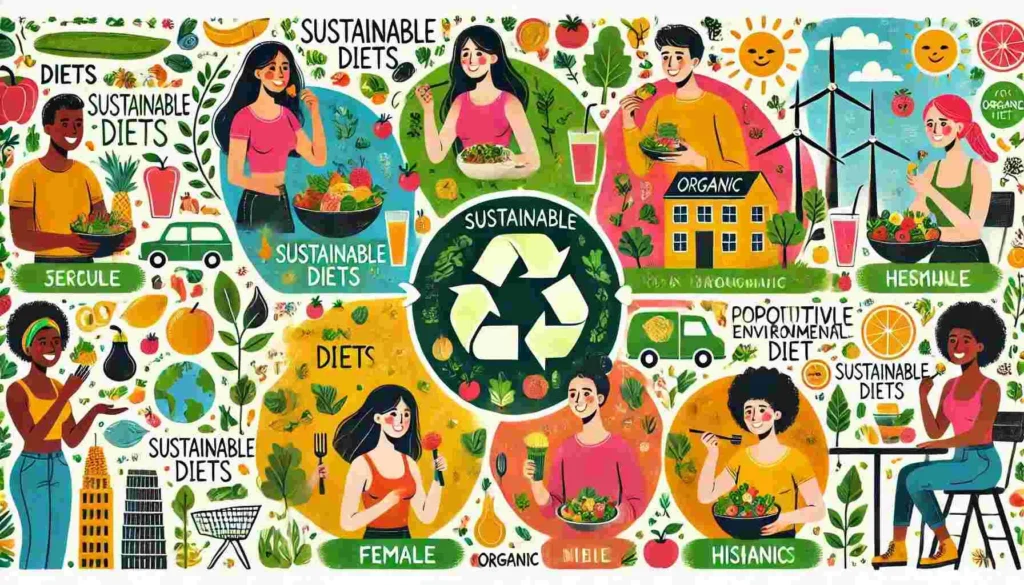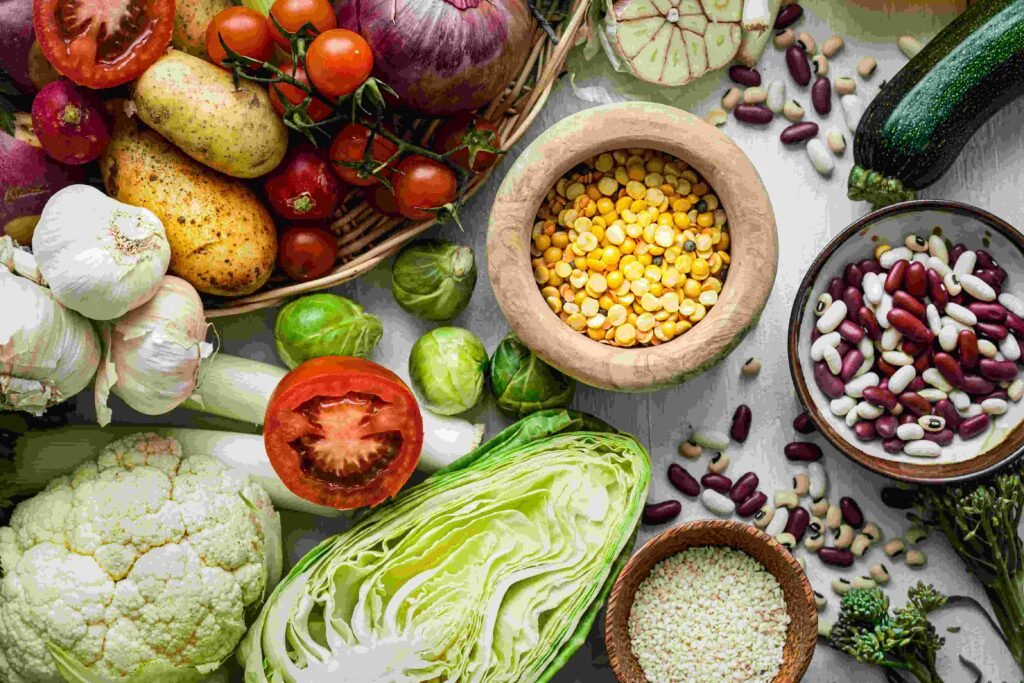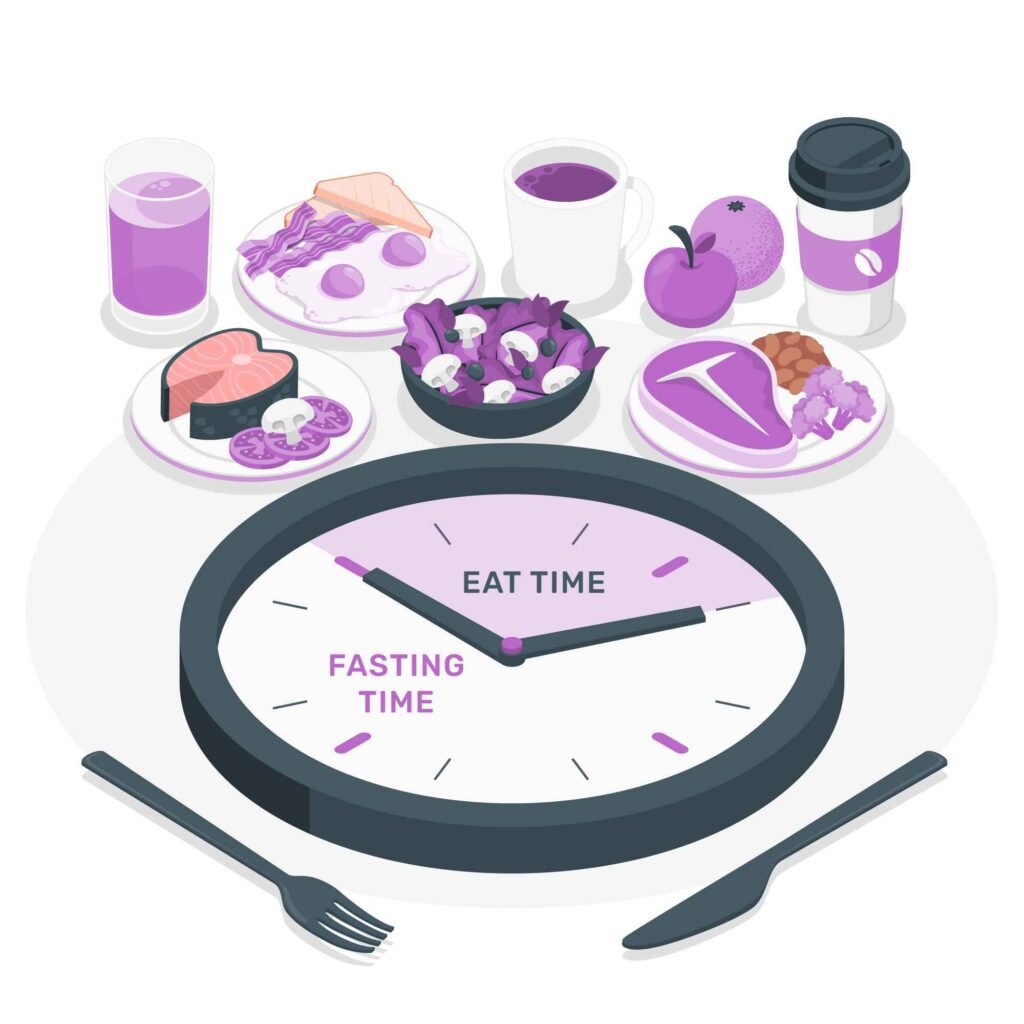
Sustainable Diets and Environmental Impact
Introduction
In recent years, the need for sustainable diets has gained significant attention as the world faces challenges related to climate change, resource depletion, and food security. A sustainable diet not only benefits personal health but also reduces the environmental footprint of food production. Adopting a more eco-conscious approach to eating is essential for preserving the planet for future generations. This article explores the concept of sustainable diets, their environmental impact, and practical ways to transition toward greener eating habits.
What is a Sustainable Diet?
Defining Sustainability in Food Choices
A sustainable diet is a way of eating that prioritizes the health of individuals, communities, and the environment. It focuses on consuming foods that are produced with minimal environmental impact while ensuring nutrition and affordability.
Key elements of sustainable diets include:
- Emphasizing Plant-Based Foods: Fruits, vegetables, legumes, nuts, and whole grains.
- Minimizing Food Waste: Reducing leftovers and making use of all edible parts of food.
- Supporting Local and Seasonal Foods: Choosing products grown close to home to reduce transportation emissions.
The Environmental Impact of Food Production
Greenhouse Gas Emissions
The agricultural sector is one of the largest contributors to greenhouse gas (GHG) emissions, including carbon dioxide, methane, and nitrous oxide. Animal agriculture, in particular, accounts for a significant percentage of these emissions due to feed production, digestion in ruminants, and manure management.
- Meat and Dairy: Producing beef and lamb generates substantially more emissions compared to plant-based proteins.
- Transport and Packaging: While food miles play a role, the type of food consumed has a greater environmental impact than how far it travels.
Water Usage
Irrigation for crops and livestock feed consumes vast amounts of freshwater. For example:
- It takes approximately 15,400 liters of water to produce 1 kilogram of beef, compared to 287 liters for 1 kilogram of potatoes.
- Unsustainable water practices deplete natural reservoirs, impacting ecosystems and communities.
Land Degradation and Biodiversity Loss
- Large-scale agriculture leads to deforestation, soil erosion, and habitat destruction.
- Clearing forests for farmland diminishes biodiversity, pushing many species toward extinction.
Benefits of Plant-Based Diets
Lower Carbon Footprint
Transitioning to a plant-based diet significantly reduces GHG emissions. Studies have shown that a vegetarian or vegan diet has:
- 50% Lower Emissions compared to an omnivorous diet.
- A reduced need for deforestation, as plant crops require less land.
Efficient Resource Use
- Plant foods typically use fewer resources than animal products. For instance, growing lentils requires far less water and energy than producing beef or cheese.
- By choosing plant-based proteins, individuals can support a more efficient and sustainable food system.
How to Transition Toward a Sustainable Diet
Start Small
- Gradually replace meat-based meals with plant-based alternatives, such as tofu, lentils, or chickpeas.
- Participate in initiatives like Meatless Mondays to reduce weekly meat consumption.
Prioritize Whole, Unprocessed Foods
- Opt for whole grains, fresh fruits, and vegetables instead of heavily processed items.
- Minimize reliance on packaged and convenience foods to reduce waste.
Choose Sustainable Protein Sources
- Incorporate plant proteins like beans, peas, and quinoa.
- Consider seafood options certified by sustainability programs like the Marine Stewardship Council (MSC).
Plan Meals Mindfully
- Plan weekly meals to avoid overbuying and reduce food waste.
- Store perishable items properly to extend shelf life and maintain quality.
Reducing Food Waste
Food waste is a significant contributor to environmental degradation, with millions of tons discarded annually. Adopting mindful habits can minimize waste and contribute to a more sustainable food system.
- Plan Your Grocery Shopping: Create a weekly meal plan to avoid over-purchasing perishable items.
- Use Leftovers Creatively: Transform extra ingredients into soups, salads, or stir-fries to minimize waste.
- Compost Food Scraps: Instead of discarding peels, cores, or expired produce, compost them to enrich soil health.
By being mindful of food consumption, you not only save money but also play a role in reducing methane emissions from landfills.
Choosing Local and Seasonal Foods
Eating locally grown and seasonal produce reduces the energy required for transportation and storage. Local farmers’ markets, co-ops, and community-supported agriculture (CSA) programs are great options for sourcing fresh, eco-friendly ingredients.
Benefits of eating local and seasonal include:
- Lower Carbon Emissions: Foods grown nearby have a smaller transportation footprint.
- Fresher Produce: Seasonal fruits and vegetables retain more nutrients and flavor.
- Support for Local Economies: Choosing local suppliers strengthens community businesses.
Focusing on regional and seasonal diets aligns your food choices with the environment’s natural cycles.
Understanding Sustainable Farming Practices
Supporting farms that prioritize sustainability is another impactful way to reduce your dietary footprint. Look for products labeled with certifications like organic, biodynamic, or fair trade.
Sustainable farming practices include:
- Crop Rotation: Preserves soil fertility and prevents pest buildup.
- Reduced Chemical Use: Minimizes harmful pesticides and fertilizers.
- Agroforestry: Combines trees with crops or livestock to enhance biodiversity.
When you choose sustainably produced food, you support agricultural methods that protect natural ecosystems and mitigate climate change.
The Role of Protein in Sustainable Diets
Protein is an essential nutrient, but its source significantly affects environmental impact. While animal-based proteins are resource-intensive, plant-based alternatives offer a more sustainable option.
Sustainable Protein Sources
- Legumes: Lentils, chickpeas, and beans are rich in protein, fiber, and essential nutrients.
- Nuts and Seeds: Almonds, sunflower seeds, and chia seeds provide healthy fats along with protein.
- Alternative Proteins: Products like tofu, tempeh, and seitan are versatile and eco-friendly.
Animal Proteins with Lower Impact
If you consume animal products, consider options with a smaller ecological footprint:
- Eggs: Require fewer resources compared to beef or pork.
- Chicken: Among meats, poultry has a relatively lower carbon footprint.
- Sustainably Caught Seafood: Opt for species that are abundant and responsibly harvested.
Embracing Flexitarianism
For those not ready to fully adopt a plant-based diet, the flexitarian approach offers a balanced solution. This eating style emphasizes plant-based meals while occasionally incorporating meat or dairy.
Benefits of a flexitarian diet include:
- Improved Health: Increased intake of fiber, vitamins, and antioxidants.
- Reduced Environmental Impact: Consuming less meat reduces GHG emissions and resource use.
- Ease of Adoption: Allows gradual changes without completely giving up favorite foods.
Flexitarianism is a realistic and effective way to contribute to sustainability without feeling restricted.
The Global Impact of Sustainable Eating
The effects of individual dietary choices extend far beyond personal health—they influence global food systems and environmental stability.
Combatting Climate Change
Switching to sustainable diets can significantly lower GHG emissions. According to research, widespread adoption of plant-based diets could reduce global emissions by up to 70%.
- Less Deforestation: Reducing demand for animal agriculture preserves forests that absorb carbon dioxide.
- Reduced Energy Consumption: Plant-based foods require less energy for production and distribution.
Enhancing Food Security
Sustainable diets ensure equitable food distribution by conserving resources and reducing waste. By consuming less resource-intensive foods, we can leave more for growing populations.
Promoting Biodiversity
Sustainable farming and eating practices help protect endangered species and maintain ecological balance. By avoiding products linked to deforestation or overfishing, consumers support habitats and biodiversity.
Addressing Common Challenges
Adopting a sustainable diet isn’t without its hurdles, but they can be overcome with simple strategies:
- Cost Concerns: Buy in bulk, focus on seasonal produce, and reduce reliance on expensive processed foods.
- Time Constraints: Prepare meals in advance and use simple, wholesome recipes.
- Limited Options: Explore farmers’ markets and online stores that specialize in eco-friendly products.
Over time, these small adjustments will feel second nature, making sustainability a seamless part of daily life.
Health Advantages of Sustainable Diets
Sustainable eating is not only beneficial for the environment but also offers numerous health benefits. By focusing on whole, nutrient-dense foods, individuals can enjoy better overall well-being.
- Reduced Risk of Chronic Diseases: Diets rich in plant-based foods have been linked to lower rates of heart disease, diabetes, and certain cancers.
- Improved Digestive Health: High-fiber foods, such as fruits, vegetables, and whole grains, support gut health and prevent digestive issues.
- Weight Management: Plant-based diets are often lower in calories and saturated fats, making it easier to maintain a healthy weight.
Prioritizing sustainable food choices ensures that your body gets the nutrients it needs without compromising the planet’s health.
Economic Benefits of Supporting Sustainability
Adopting sustainable eating habits can positively impact local economies and global food systems.
- Boosting Local Agriculture: Purchasing from nearby farms keeps money within the community and supports small businesses.
- Reducing Healthcare Costs: Healthier eating reduces the prevalence of diet-related diseases, lowering long-term healthcare expenses.
- Minimizing Food Waste: Efficient use of food saves money at the household level while reducing landfill costs for municipalities.
Sustainability in food consumption promotes a more equitable and efficient economy, benefiting everyone.
Inspiring Others to Eat Sustainably
Educating Family and Friends
Encourage those around you to adopt sustainable eating habits by sharing knowledge and resources.
- Lead by Example: Show how delicious and satisfying plant-based meals can be.
- Host Sustainable Dinners: Prepare eco-friendly meals for gatherings to spark interest in sustainable diets.
- Share Recipes and Tips: Provide practical ideas for reducing waste, shopping locally, and preparing balanced meals.
Raising awareness among your social circle creates a ripple effect, inspiring broader adoption of sustainable practices.
Leveraging Social Media
Social media platforms are powerful tools for spreading the message about sustainable diets.
- Post Meal Ideas: Share pictures and recipes of your plant-based meals to inspire followers.
- Highlight Local Farmers: Promote nearby growers and markets to encourage others to shop locally.
- Advocate for Change: Use your platform to discuss the environmental impact of food choices and support sustainable initiatives.
By using social media strategically, you can amplify your efforts and reach a wider audience.
Overcoming Misconceptions About Sustainable Eating
Myth: Sustainable Diets Are Expensive
Reality: While some eco-friendly foods can be costly, sustainable eating doesn’t have to break the bank.
- Buy seasonal produce, which is often cheaper than out-of-season options.
- Plan meals to reduce food waste and save money.
- Explore bulk bins for grains, legumes, and nuts to cut down on packaging and costs.
Myth: Sustainable Eating Requires Giving Up Meat Entirely
Reality: Flexitarian or reducetarian approaches allow you to enjoy meat occasionally while still making a positive impact.
- Prioritize smaller portions of high-quality, sustainably sourced meat.
- Experiment with plant-based proteins for variety.
Myth: Sustainable Foods Lack Flavor
Reality: Plant-based meals are highly versatile and can be packed with flavor using fresh herbs, spices, and creative cooking techniques.
By debunking these misconceptions, you can help others feel more confident about transitioning to a sustainable diet.
Taking Action for a Sustainable Future
Small Changes, Big Impact
Even minor adjustments in daily habits can collectively make a significant difference.
- Eat More Plants: Gradually increase the proportion of fruits, vegetables, and legumes on your plate.
- Limit Food Waste: Plan meals, use leftovers creatively, and compost scraps.
- Choose Ethical Brands: Support companies committed to sustainability and eco-friendly practices.
Engaging with Communities
Joining or forming local groups focused on sustainable eating can amplify your efforts.
- Community Gardens: Participate in or start a garden to grow fresh produce sustainably.
- Workshops and Events: Attend educational events to learn more about sustainability and share insights.
- Advocate for Policy Change: Support initiatives that promote sustainable agriculture and food systems.
Collective action is crucial for driving widespread change and ensuring a healthier planet for future generations.
A Vision for Future Generations
By embracing sustainable diets, we’re not just addressing today’s challenges but also shaping a better world for future generations.
- Preserving Natural Resources: Conserving water, land, and energy ensures that future populations can thrive.
- Combatting Climate Change: Reducing greenhouse gas emissions mitigates the worst effects of global warming.
- Improving Food Security: Sustainable practices help feed a growing population without depleting resources.
Every bite we take is an opportunity to contribute to a healthier planet and a brighter future.



